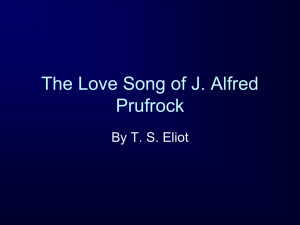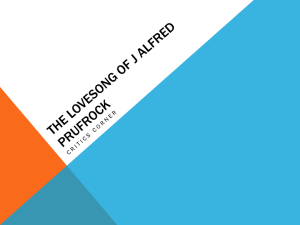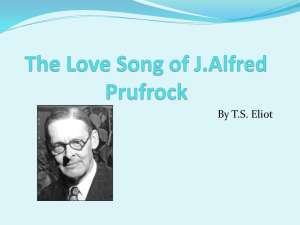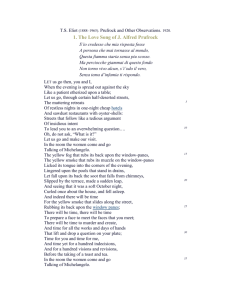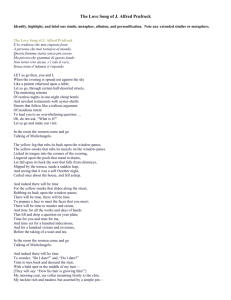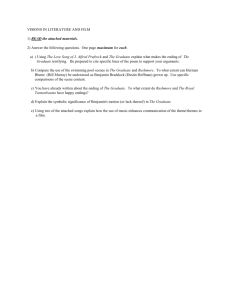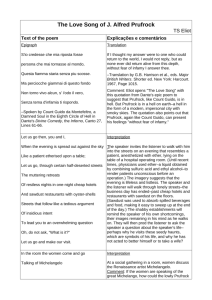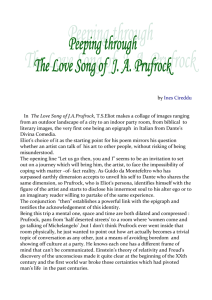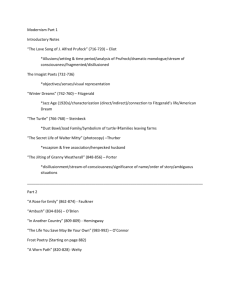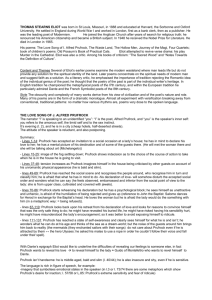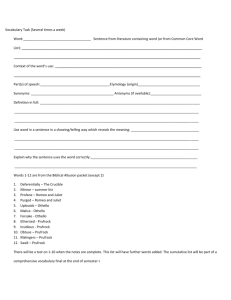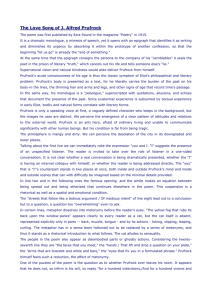Prufrock
advertisement
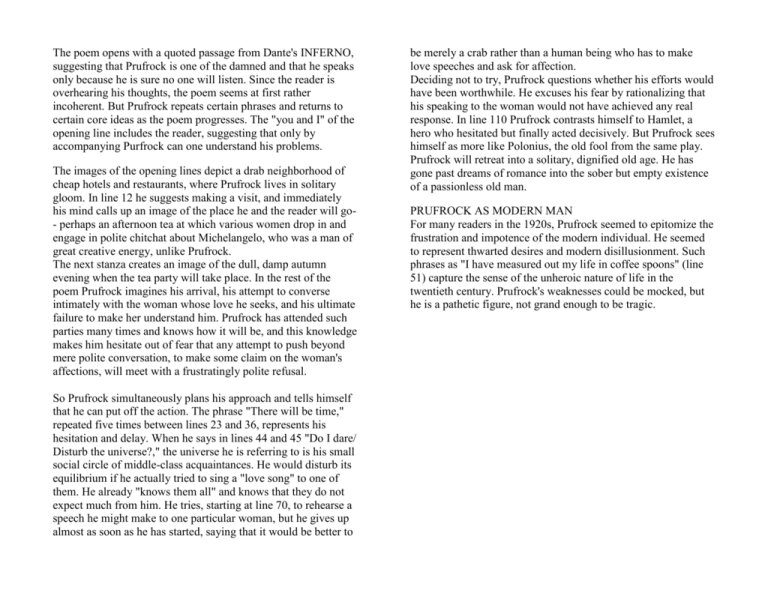
The poem opens with a quoted passage from Dante's INFERNO, suggesting that Prufrock is one of the damned and that he speaks only because he is sure no one will listen. Since the reader is overhearing his thoughts, the poem seems at first rather incoherent. But Prufrock repeats certain phrases and returns to certain core ideas as the poem progresses. The "you and I" of the opening line includes the reader, suggesting that only by accompanying Purfrock can one understand his problems. The images of the opening lines depict a drab neighborhood of cheap hotels and restaurants, where Prufrock lives in solitary gloom. In line 12 he suggests making a visit, and immediately his mind calls up an image of the place he and the reader will go- perhaps an afternoon tea at which various women drop in and engage in polite chitchat about Michelangelo, who was a man of great creative energy, unlike Prufrock. The next stanza creates an image of the dull, damp autumn evening when the tea party will take place. In the rest of the poem Prufrock imagines his arrival, his attempt to converse intimately with the woman whose love he seeks, and his ultimate failure to make her understand him. Prufrock has attended such parties many times and knows how it will be, and this knowledge makes him hesitate out of fear that any attempt to push beyond mere polite conversation, to make some claim on the woman's affections, will meet with a frustratingly polite refusal. So Prufrock simultaneously plans his approach and tells himself that he can put off the action. The phrase "There will be time," repeated five times between lines 23 and 36, represents his hesitation and delay. When he says in lines 44 and 45 "Do I dare/ Disturb the universe?," the universe he is referring to is his small social circle of middle-class acquaintances. He would disturb its equilibrium if he actually tried to sing a "love song" to one of them. He already "knows them all" and knows that they do not expect much from him. He tries, starting at line 70, to rehearse a speech he might make to one particular woman, but he gives up almost as soon as he has started, saying that it would be better to be merely a crab rather than a human being who has to make love speeches and ask for affection. Deciding not to try, Prufrock questions whether his efforts would have been worthwhile. He excuses his fear by rationalizing that his speaking to the woman would not have achieved any real response. In line 110 Prufrock contrasts himself to Hamlet, a hero who hesitated but finally acted decisively. But Prufrock sees himself as more like Polonius, the old fool from the same play. Prufrock will retreat into a solitary, dignified old age. He has gone past dreams of romance into the sober but empty existence of a passionless old man. PRUFROCK AS MODERN MAN For many readers in the 1920s, Prufrock seemed to epitomize the frustration and impotence of the modern individual. He seemed to represent thwarted desires and modern disillusionment. Such phrases as "I have measured out my life in coffee spoons" (line 51) capture the sense of the unheroic nature of life in the twentieth century. Prufrock's weaknesses could be mocked, but he is a pathetic figure, not grand enough to be tragic. Thomas Stearns Eliot (1888-1965) The Love Song of J. Alfred Prufrock S'io credesse che mia risposta fosse A persona che mai tornasse al mondo, Questa fiamma staria senza piu scosse. Ma percioche giammai di questo fondo Non torno vivo alcun, s'i'odo il vero, Senza tema d'infamia ti rispondo. "If I but thought that my response were made to one perhaps returning to the world, this tongue of flame would cease to flicker. But since, up from these depths, no one has yet returned alive, if what I hear is true, I answer without fear of being shamed -- Dante’s Inferno XXVII, 61-66 Let us go then, you and I, When the evening is spread out against the sky Like a patient etherized upon a table; Let us go, through certain half-deserted streets, The muttering retreats Of restless nights in one-night cheap hotels And sawdust restaurants with oyster-shells: Streets that follow like a tedious argument Of insidious intent To lead you to an overwhelming question ... Oh, do not ask, "What is it?" Define: etherized Connotation? Describe the women Let us go and make our visit. In the room the women come and go Talking of Michelangelo. The yellow fog that rubs its back upon the window-panes, The yellow smoke that rubs its muzzle on the window-panes, Licked its tongue into the corners of the evening, Lingered upon the pools that stand in drains, Let fall upon its back the soot that falls from chimneys, Slipped by the terrace, made a sudden leap, And seeing that it was a soft October night, Curled once about the house, and fell asleep. And indeed there will be time For the yellow smoke that slides along the street, Rubbing its back upon the window-panes; There will be time, there will be time To prepare a face to meet the faces that you meet; There will be time to murder and create, And time for all the works and days of hands That lift and drop a question on your plate; Time for you and time for me, And time yet for a hundred indecisions, And for a hundred visions and revisions, Before the taking of a toast and tea. Paraphrase: Identify and explain the metaphor In the room the women come and go Talking of Michelangelo. And indeed there will be time To wonder, "Do I dare?" and, "Do I dare?" Time to turn back and descend the stair, With a bald spot in the middle of my hair -(They will say: 'How his hair is growing thin!") My morning coat, my collar mounting firmly to the chin, My necktie rich and modest, but asserted by a simple pin -(They will say: "But how his arms and legs are thin!") Do I dare Disturb the universe? In a minute there is time For decisions and revisions which a minute will reverse. For I have known them all already, known them all: Have known the evenings, mornings, afternoons, I have measured out my life with coffee spoons; I know the voices dying with a dying fall Beneath the music from a farther room. So how should I presume? And I have known the eyes already, known them all-The eyes that fix you in a formulated phrase, And when I am formulated, sprawling on a pin, When I am pinned and wriggling on the wall, Then how should I begin To spit out all the butt-ends of my days and ways? And how should I presume? And I have known the arms already, known them all-Arms that are braceleted and white and bare (But in the lamplight, downed with light brown hair!) Is it perfume from a dress That makes me so digress? Arms that lie along a table, or wrap about a shawl. And should I then presume? And how should I begin? Describe his fears Inference Identify and explain the metaphor here Describe the speaker’s body language here. What is the source of his main conflict? Shall I say, I have gone at dusk through narrow streets And watched the smoke that rises from the pipes Of lonely men in shirt-sleeves, leaning out of windows? ... Compare to Nick’s thoughts (use quote from GG) Paraphrase each of the following stanzas. Connect to Nick and Gatsby as possible. I should have been a pair of ragged claws Scuttling across the floors of silent seas. **** And the afternoon, the evening, sleeps so peacefully! Smoothed by long fingers, Asleep ... tired ... or it malingers, Stretched on the floor, here beside you and me. Should I, after tea and cakes and ices, Have the strength to force the moment to its crisis? But though I have wept and fasted, wept and prayed, Though I have seen my head (grown slightly bald) brought in upon a platter, I am no prophet -- and here's no great matter; I have seen the moment of my greatness flicker, And I have seen the eternal Footman hold my coat, and snicker, And in short, I was afraid. And would it have been worth it, after all, After the cups, the marmalade, the tea, Among the porcelain, among some talk of you and me, Would it have been worth while, To have bitten off the matter with a smile, To have squeezed the universe into a ball To roll it towards some overwhelming question, To say: "I am Lazarus, come from the dead, Lazarus is a Biblical allusion to a man who Jesus raised from the dead. Come back to tell you all, I shall tell you all" -What is the speaker’s fear? If one, settling a pillow by her head Should say: "That is not what I meant at all; That is not it, at all." And would it have been worth it, after all, Would it have been worth while, After the sunsets and the dooryards and the sprinkled streets, After the novels, after the teacups, after the skirts that trail along the floor -And this, and so much more?-It is impossible to say just what I mean! But as if a magic lantern threw the nerves in patterns on a screen: Would it have been worth while If one, settling a pillow or throwing off a shawl, And turning toward the window, should say: "That is not it at all, That is not what I meant, at all." No! I am not Prince Hamlet, nor was meant to be; Am an attendant lord, one that will do To swell a progress, start a scene or two, Advise the prince; no doubt, an easy tool, Deferential, glad to be of use, Politic, cautious, and meticulous; Full of high sentence, but a bit obtuse; At times, indeed, almost ridiculous-Almost, at times, the Fool. I grow old ... I grow old ... I shall wear the bottoms of my trousers rolled. Shall I part my hair behind? Do I dare to eat a peach? I shall wear white flannel trousers, and walk upon the beach. I have heard the mermaids singing, each to each. I do not think that they will sing to me. I have seen them riding seaward on the waves Combing the white hair of the waves blown back When the wind blows the water white and black. We have lingered in the chambers of the sea By sea-girls wreathed with seaweed red and brown Till human voices wake us, and we drown. What happens to Prufrock at the end of the poem? Literally? How does he feel?
